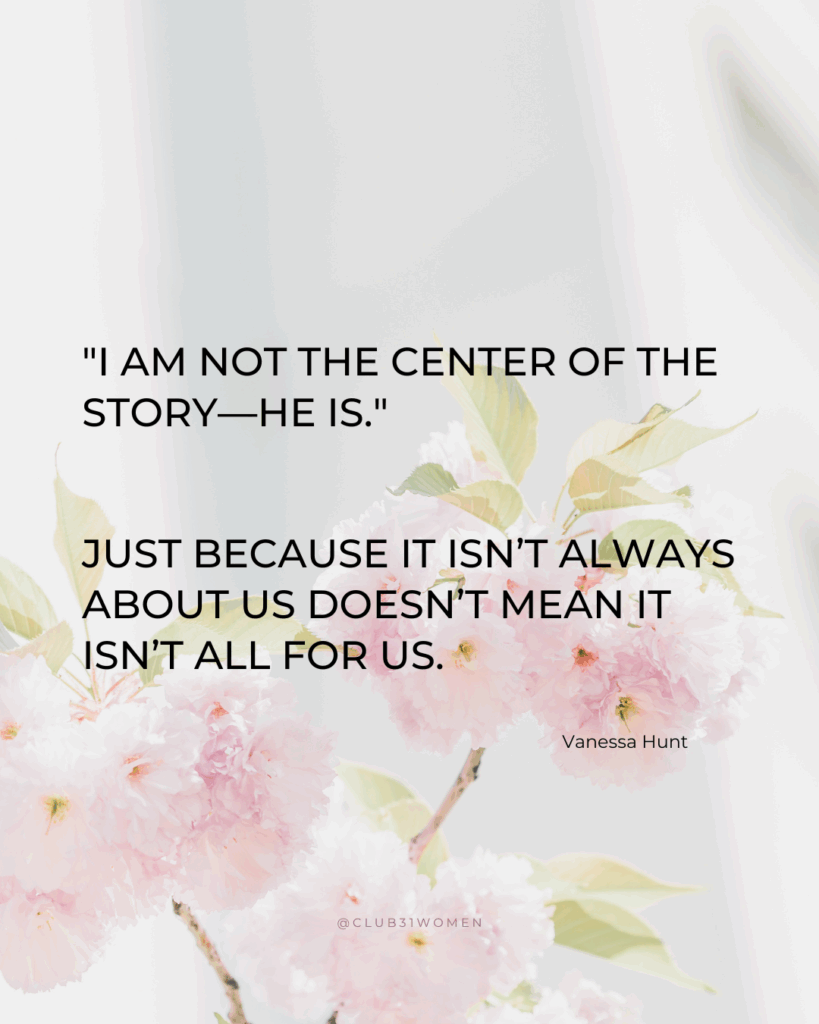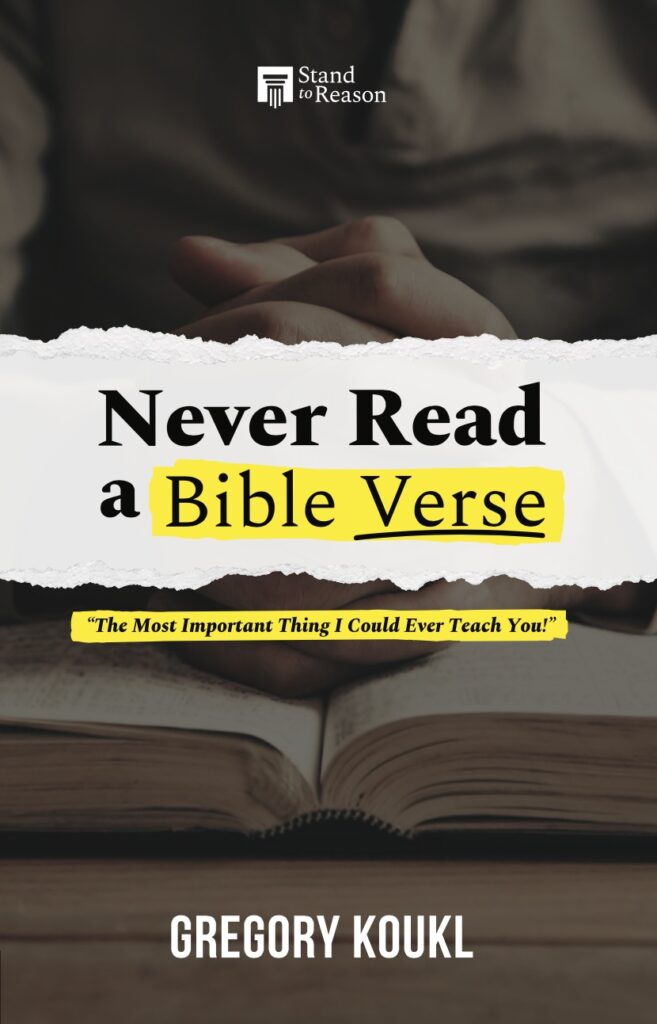You’re Not the Center of the Story
Walk through Hobby Lobby on any given day and you will find countless signs, pillows and knick-knacks emblazoned with messages. Some are more overt, like wall art with the word ‘bathroom’ on it (wonder which room that’s for!) while others are a bit more subtle. A pastoral painting with sheep in the distance and a reference to the ‘Good Shepherd’ is less obvious but is still meant to convey meaning. While this home decor trend has dwindled a bit, what hasn’t lost momentum is our desire to see ourselves in words or phrases.

Whether it’s humorous or sentimental, we are drawn to that which captures our emotions and then reflects them back to us. So, what would happen if you discovered that your favorite Bible verse, the one that you’ve clung to during the most challenging times in your life, wasn’t actually written about you? It might be tempting to think that this revelation is bad news but I’m here to tell you that it’s some of the best news you could ever hear.
A New Lens for Scripture
I grew up attending church every Sunday, youth group on Wednesday nights and went to a Christian university. And yet, at no point in time was I instructed in the practice of hermeneutics. What does that mean? Well, hermeneutics is the study and knowledge of interpretation. It’s how we are able to know the true meaning of a text. A few years ago I learned that I had not been properly interpreting certain passages of scripture.
My method for studying the Bible used to almost always include indulging in asking the question, “What does this verse mean to me?” instead of “What does this verse mean?” This approach might be easier and more comforting at times but its an inversion of how we are supposed to be reading God’s Word. I realized that I had taken promises and declarations made for specific people groups at specific moments in time for specific purposes and made them transferable to my own circumstances. But I am not the center of the story, He is. So I don’t have the right to claim something that doesn’t belong to me even if it does look good stitched onto a pillow.
Jeremiah 29:11 and the Danger of Misapplication
Let’s take a look at one of the most commonly used verses that people will quote to provide encouragement for everything from navigating a challenging situation to sending your children off to college. Jeremiah 29:11 says, “For I know the plans I have for you,” declares the Lord, “plans to prosper you and not to harm you, plans to give you hope and a future.” In isolation, this verse is like a comforting hug and the perfect inscription for the inside of a greeting card. But, when we take just one verse out of a passage in a kind of ‘copy and paste’ method we can so easily make the mistake of assuming a promise was made it us when, in fact, it wasn’t.
Let’s expand our reading and seek to understand what is happening within the context of this passage. From the very beginning of Jeremiah’s letter, we know his intended audience. “This is the text of the letter that the prophet Jeremiah sent from Jerusalem to the surviving elders among the exiles and to the priests, the prophets and all the other people Nebuchadnezzar had carried into exile from Jerusalem to Babylon.” This letter was sent to a specific group of people and the promise mentioned in verse eleven was to them, not to me. When I first realized that I had always misinterpreted this and other verses I found myself struggling a bit. These verses did actually encourage me so what could be so wrong with reading them that way? The reality is that I had conditioned my appetite for God’s Word to be satisfied by quips and quotes rather than hungering for the fullness that was available to me.

Not About You, Still for You
So, what are we to do with the knowledge that we aren’t the center of the story? Well, just because it isn’t always about us, doesn’t mean that it isn’t all for us. “All Scripture is God-breathed and is useful for teaching, rebuking, correcting and training in righteousness, so that the servant of God may be thoroughly equipped for every good work.” 2 Timothy 3:16-17 When we read through passages of the Bible that aren’t specifically addressing you, it’s imperative to keep in mind that they are always teaching you about Him.
When we read the Word with the right understanding it:
1. Reminds us of His nature
God doesn’t just love; He IS love itself. We can’t know what love truly is outside of knowing the One who defines that word and fulfills every aspect of it. His perfect nature is revealed throughout the entire story and is still being revealed even now.
“For his invisible attributes, namely, his eternal power and divine nature, have been clearly perceived, ever since the creation of the world, in the things that have been made. So they are without excuse.” Romans 1:20
“He is the image of the invisible God, the firstborn of all creation. For by him all things were created, in heaven and on earth, visible and invisible, whether thrones or dominions or rulers or authorities—all things were created through him and for him. And he is before all things, and in him all things hold together.” Colossians 1:15-17
2. Restores our hope
While not every promise made in the Bible was made directly to us, we can confidently place our hope in the Lord and know that He will always be with us. We know what has already been accomplished through the sacrifice of Jesus Christ so we should be the kind of women who live boldly with hope for what is to come.
“Blessed be the God and Father of our Lord Jesus Christ! According to his great mercy, he has caused us to be born again to a living hope through the resurrection of Jesus Christ from the dead.” 1 Peter 1:3
“May the God of hope fill you with all joy and peace as you trust in him, so that you may overflow with hope by the power of the Holy Spirit.” Romans 15:13
3. Renews our trust
Even when we don’t fully understand His ways, we can trust Him to always be faithful and good. The promises made to different people groups and different times may not be the same promises made to us today but the one constant is that the Lord is always trustworthy and that is a promise we can cling to when we face life’s greatest challenges.
In His Word
“Therefore I tell you, do not worry about your life, what you will eat or drink; or about your body, what you will wear. Is not life more than food, and the body more than clothes? 26 Look at the birds of the air; they do not sow or reap or store away in barns, and yet your heavenly Father feeds them. Are you not much more valuable than they?” Matthew 6:25-16
“Trust in the Lord with all your heart and lean not on your own understanding; in all your ways submit to him, and he will make your paths straight.” Proverbs 3:5-6
In Your Life
In our “hot takes” culture it can be tempting to become satisfied with bite sized theology especially when it scratches that me-centered itch. But, let me encourage you today to seek more for your walk with Christ. True sanctification requires that we know and understand God’s Word the way in which it’s intended for us. And in a society that constantly tells us that WE are the center of everything, it’s revolutionary to show the world that HE is.
We Recommend
If you would like to learn more about hermeneutics and how to properly study God’s Word, we suggest the following resources:
Never Read a Bible Verse
How to Read the Bible for All It’s Worth
Free Hermeneutics Class from Talbot School of Theology


Let’s Connect
You can find Vanessa on her website At The Picket Fence where she passionately shares how to have peace in your heart and peace in your home. Join her also on Facebook and Instagram.
